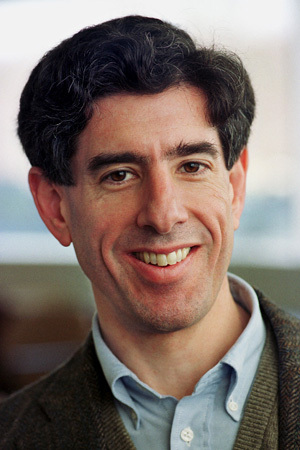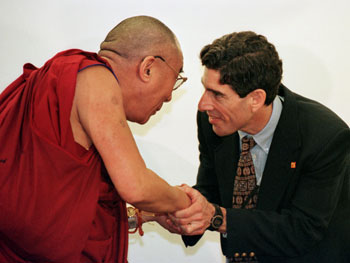
 The Living Hero program presents an interview with celebrated neuroscientist, Dr. Richard Davidson. Dr. Davidson is a William James and Vilas Research Professor of Psychology and Psychiatry at the University of Wisconsin-Madison. He directs the Waisman Laboratory for Brain Imaging and Behavior where he conducts research on the short- and long-term effects of meditation practices on human emotion and the circuitry of the brain.
He holds a doctorate from Harvard University and has published more than 250 articles, chapters and reviews. The founding co-editor of the new American Psychological Association journal, EMOTION and he has also edited 13 books.
One of Dr. Davidson's most valuable findings is that happiness and compassion are trainable skills that can be developed, just as we can learn to play a musical instrument; that it is possible to train a mind to be happy and peaceful.
We talked about:
• What prompted Dr. Davidson's career path
• Meditation as a path of transformation
• The different forms of meditation
• How meditation changes the brain
• Meditation in health and in education
• Long-term effects of meditation on brain function and gene expression
• Meditation and Christianity
• How to learn more about Dr. Davidson's work
Numerous honors and awards of distinction have come to Dr. Davidson, including the most distinguished award for science given by the American Psychological Association – the Scientific Contribution Award. He has also received the Research Scientist Award and the MERIT Award from the National Institutes of Mental Health (NIMH); and many other honors recognizing his groundbreaking contributions.
In 2003, Dr. Davidson was elected to the American Academy of Arts and Sciences and in 2004, to the Wisconsin Academy of Sciences, Arts and Letters. In 2006, he was named one of the 100 most influential people in the world by Time Magazine.
Davidson maintains a close, collaborative relationship with Tibet's spiritual leader, the Dalai Lama, the world's best-known practitioner of Buddhist meditation. The Dalai Lama first invited Davidson to his home in Dharamsala, India, in 1992 after learning about Davidson's innovative research into the neuroscience of emotions. Dr. Davidson has had the opportunity to study the brains of many of the world’s most advanced meditation practitioners.
The Living Hero program presents an interview with celebrated neuroscientist, Dr. Richard Davidson. Dr. Davidson is a William James and Vilas Research Professor of Psychology and Psychiatry at the University of Wisconsin-Madison. He directs the Waisman Laboratory for Brain Imaging and Behavior where he conducts research on the short- and long-term effects of meditation practices on human emotion and the circuitry of the brain.
He holds a doctorate from Harvard University and has published more than 250 articles, chapters and reviews. The founding co-editor of the new American Psychological Association journal, EMOTION and he has also edited 13 books.
One of Dr. Davidson's most valuable findings is that happiness and compassion are trainable skills that can be developed, just as we can learn to play a musical instrument; that it is possible to train a mind to be happy and peaceful.
We talked about:
• What prompted Dr. Davidson's career path
• Meditation as a path of transformation
• The different forms of meditation
• How meditation changes the brain
• Meditation in health and in education
• Long-term effects of meditation on brain function and gene expression
• Meditation and Christianity
• How to learn more about Dr. Davidson's work
Numerous honors and awards of distinction have come to Dr. Davidson, including the most distinguished award for science given by the American Psychological Association – the Scientific Contribution Award. He has also received the Research Scientist Award and the MERIT Award from the National Institutes of Mental Health (NIMH); and many other honors recognizing his groundbreaking contributions.
In 2003, Dr. Davidson was elected to the American Academy of Arts and Sciences and in 2004, to the Wisconsin Academy of Sciences, Arts and Letters. In 2006, he was named one of the 100 most influential people in the world by Time Magazine.
Davidson maintains a close, collaborative relationship with Tibet's spiritual leader, the Dalai Lama, the world's best-known practitioner of Buddhist meditation. The Dalai Lama first invited Davidson to his home in Dharamsala, India, in 1992 after learning about Davidson's innovative research into the neuroscience of emotions. Dr. Davidson has had the opportunity to study the brains of many of the world’s most advanced meditation practitioners.
 Visit these websites for more information:
Waisman Lab website
U of Wisconsin Psychology Department website
Enjoy the show! (The interview is about 25 minutes)
Listen at your convenience!
Visit these websites for more information:
Waisman Lab website
U of Wisconsin Psychology Department website
Enjoy the show! (The interview is about 25 minutes)
Listen at your convenience!
No comments yet. Be the first to say something!